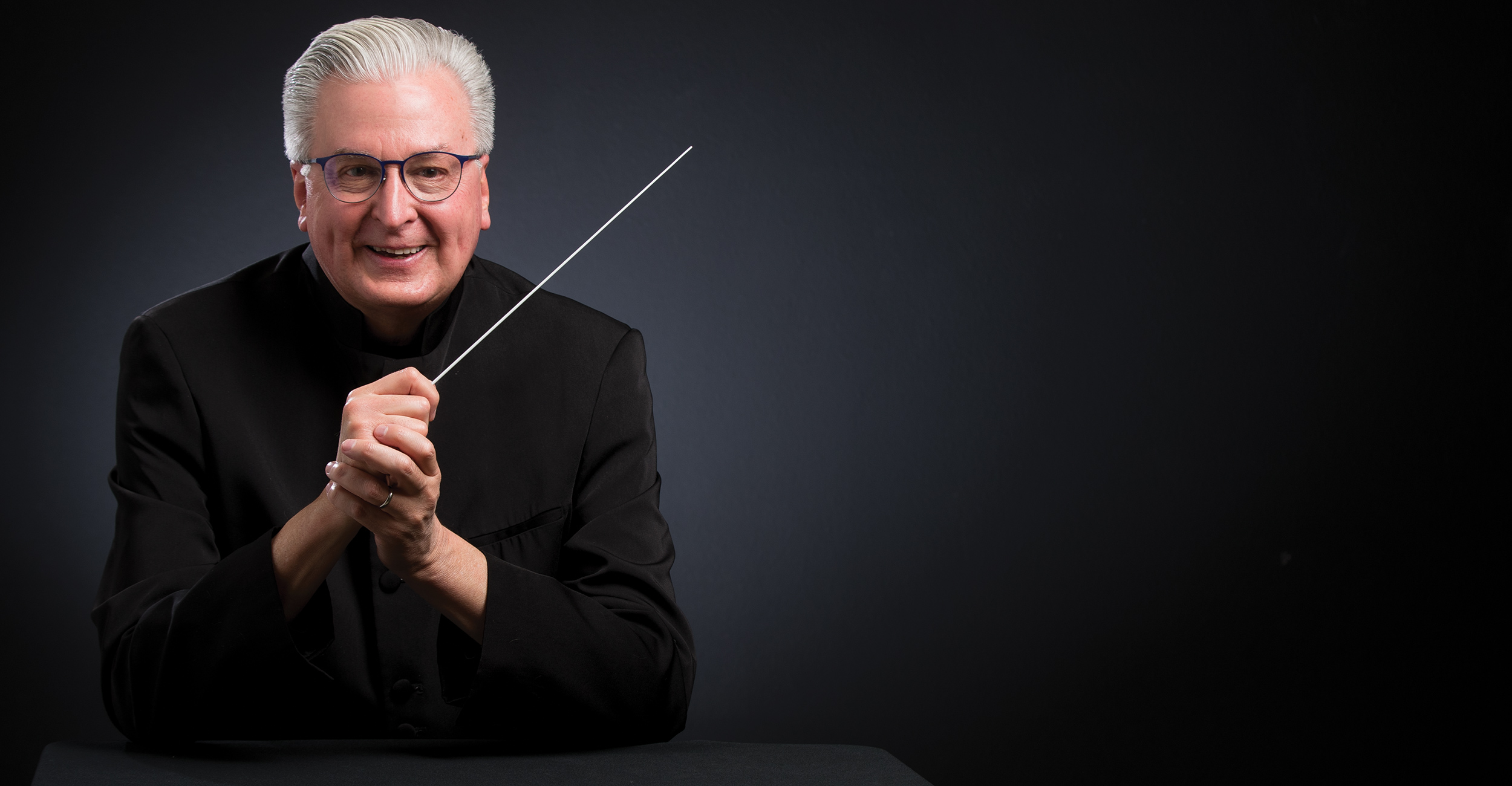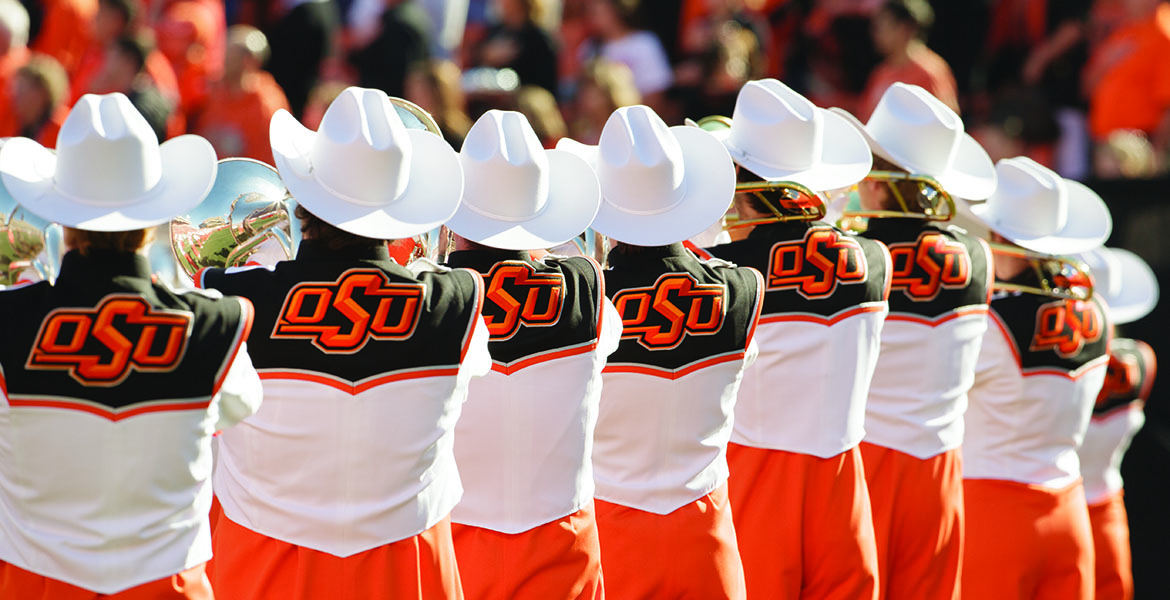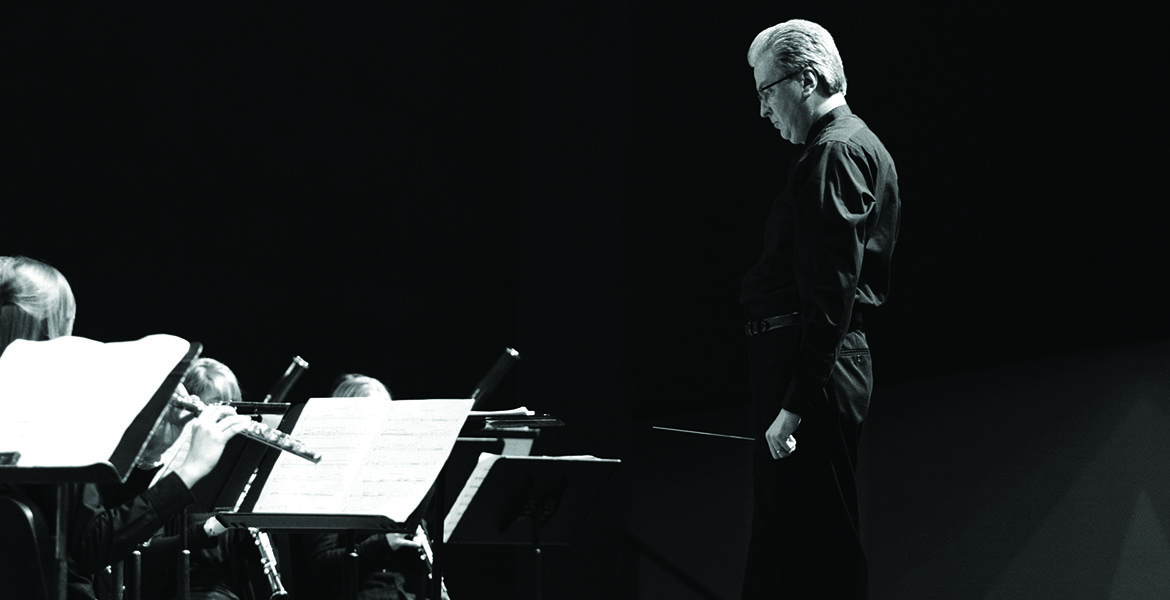
As he steps down, Dr. Joseph Missal reflects on 35 years of leading the OSU band program
Wednesday, April 28, 2021
Media Contact: Mack Burke | Editorial Coordinator | 405-744-5540 | editor@okstate.edu
The Grand Finale
Dr. Joseph Missal put down his baton for the last time as director of bands and Regents Professor of Conducting for the Oklahoma State University band program on April 17, the last concert of the season.
The pandemic stole his annual opportunity to conduct the “Alma Mater” at OSU’s football games, so he ended the concert with the familiar song before closing the books on 35 years as a Cowboy in May, leaving behind a band program that has been revolutionized under his leadership.
Missal, who was recently inducted into the Oklahoma Higher Education Heritage Society Hall of Fame, once wrestled with being an architect or a musician. Architecture, after all, Missal said, is just still music. In the end, the music won.
“When I went to Michigan State as an undergrad, I thought I wanted to be a jazz music player,” Missal said. “I thought I wanted to play with Stan Kanton or Buddy Rich or someone like that.”
He made the top jazz ensemble. He could hold his own, but others were better. He decided he could be the world’s greatest college marching band director. He was good at that too, but not where he wanted to be.
While studying for his master’s degree at the University of Cincinnati College-Conservatory of Music, Missal discovered his calling. He found a home on the podium, becoming a channel for the music. He likens it to a work in visual interpretation, — passed to musicians through gestures, movements and facial expressions — that inspires “the shape of the musical line.” A former student called Missal so aurally gifted that he “can hear grass grow.”
“I love conducting,” Missal said. “It enables me to collaborate with people who love to make music toward an artful goal. Together, we combine what we know intellectually with what we feel intuitively to create something beautiful. Like all mysteries of great art, it is hard to put into words. The same piece will always sound unique with a different conductor.”
After graduating with his master’s in 1978, Missal and his wife, Denise, packed their things and moved to Billings, Montana, where Missal became the instrumental professor for tiny Rocky Mountain College.
“Two of the most dynamic years of my life were spent in Stillwater with Dr. Missal. He has a deep, profound and completely honest love of the art form. And he’s a man of deep integrity. That integrity is actually what permeates how he teaches and deals with students.”
“I was 23 or 24 at the time, and you can embrace anything at that time in life,” he said. “We hooked a U-Haul up to our car and drove all the way to Billings. The state fair was there, and we couldn’t find a hotel. We found a dormitory that was open on campus, and we slept on the couches that night. When you’re younger, you’re not really afraid of anything.”
Missal had 48 students the first year. In three years, Rocky Mountain’s band program had expanded to 120 students out of a student body of 500. He often worked from 8 in the morning to 10 at night, and he loved it.
“It was exhausting,” he said. “A little over $10,000 (a year salary) on a tenure-track position and literally working 12- to 14-hour days. I had students older than I was.”
After three years in Montana and four years at Eastern New Mexico University, Missal came to OSU in the fall of 1986 to administer the entire band program, including 10 bands, scholarships, recruiting, tours and the budget. He expected to stay for five or six years but a few years turned into a decade, then turned into more than three.
“It just kept getting better and better,” he said.
When he began, his wind ensemble was more than half non-music majors. Thirty-five years later, the wind ensemble is all music majors but one. There are three concert bands and two jazz ensembles. The marching band grew from 135 to 350 members. The musical sophistication of the students has changed over time as well, with subsequent classes arriving more advanced than their predecessors.
“It’s another level than what I was dealing with when I first came here,” Missal said. “Now we have kids from all over the United States who come for our program. We have 12 different states represented in my top group right now.”
The years read like a travel guide of musical excellence, with performances down the road in Tulsa and as far away as Japan.
“There have been some amazing musical performances when you have a reciprocal relationship with the audience,” he said. “They were so into what we were doing, and we were so into the appreciation that it took the music to another level.”
Music has been the gravity that held Missal’s career in orbit, but his students and colleagues understand that his greatest gift may have been relationships. Missal said a person must embrace two things to be successful as the leader of a collegiate band program: You must love people, and you better love the music.
“I don’t think you can do either one without the other,” he said. “You have to love people and you have to love music to be successful. I love that it’s different every day. There’s always new music to explore, and there are always different ways to achieve excellence. You have people who are rotating every year, a different class of students with different strengths and weaknesses. You all have to work together to make it go somewhere.”

Ryan Gartner, assistant band director for Jenks (Oklahoma) High School, studied with Missal from 2005 through 2012 for his bachelor’s and master’s degrees.
“I really owe everything I have career-wise to Dr. Missal,” he said.
Gartner was set to attend another university, but his father convinced him to set up an audition at OSU to be sure. Gartner found Missal kind, open and willing to answer questions — and so he changed his commitment to OSU at the last minute.
“It was the best thing that happened to me,” he said. “I think OSU has the better program.”
Former OSU graduate student Chad Simons, now associate professor of music at the University of New Mexico, agrees. His years with Missal were transformative — personally and professionally.
“Two of the most dynamic years of my life were spent in Stillwater with Dr. Missal,” he said. “He has a deep, profound and completely honest love of the art form. And he’s a man of deep integrity. That integrity is actually what permeates how he teaches and deals with students.”
Gartner and Simons believe Missal has gained almost legendary status in the world of collegiate bands, and rightly so. His musical prowess coupled with his personality made it inevitable.
“The program is what it is because of him,” Gartner said. “There’s no doubt about
that. The school of music is losing a big force in the music world. Truly, it’s a
huge page in the history books for Dr. Missal to retire. His influence will still
be there for years to come through other faculty, and students will probably want
to carry on his expectations and standards of excellence. He’s one of a
kind.”
Simons agrees.
“He has got to be considered one of the most impactful faculty members in the School of Music in the last 100 years. He’s got to be,” Simons said. “He built that program from humble beginnings into something respected nationally and internationally.”
Dr. Jeff Loeffert, director of the Michael and Anne Greenwood School of Music, said
he is grateful to Missal and his career-long
investment in OSU’s music program.
“Dr. Missal is among a small number of faculty in the Greenwood School of Music who have created a trajectory of long-term success for our program,” Loeffert said. “We owe our current position to music faculty like Dr. Missal who invested their careers in ensuring that the program achieves at its maximum potential and that we steadily improved year after year.”

Missal said the past year was more tiring than his first at the small Montana college. In response to COVID-19, he has been conducting behind a 7-foot- by-7-foot plexiglass screen, wearing a mask and a visor. A band may have 50 musicians, but never more than 20 at a time were present, spaced 6 feet apart.
“It’s very difficult work. I feel like I’m working 10 to 20 times harder than I have ever worked in my life — and I’ve always worked really hard — to come close to achieving the same results,” he said. “The students make it worth it because they’re working so hard, and they’re so thrilled to have an opportunity to play during this awful pandemic time period.”
Loeffert calls it unfortunate that Missal’s last year at OSU occurred with the pandemic, but no one could have done it better.
“This year will be part of his legacy as well. When Dr. Missal’s students look back at this year, they will remember a professor who was committed to helping them achieve at their fullest potential despite the difficult circumstances,” Loeffert said. “Really, what better lesson could there be? We do not find a path to success — we create a path to success. Our aim is to serve our students, and even a pandemic will not stop us from meeting our instructional mission. Dr. Missal’s legacy at OSU will be predicated on this platitude, and in a strange way, overcoming the instructional challenges as a result of the pandemic provide a fitting closure to a long and successful career.”
Missal feels like he’s leaving the program in a good place for the next generation, as well as in good hands. There’s a specialist for every instrument now, a goal he had for years.
“We have such a good applied wind and percussion faculty — the entire school of music is top-drawer people,” he said. “They’re really first-class.”
He’s also leaving with The McKnight Center and Greenwood School of Music in place, each changing the trajectory of Oklahoma State’s music program.
“I’m so grateful to Michael and Anne Greenwood for giving us the gift of such a beautiful facility to study and make music,” Missal said. “But it was never about being in a new building for me. It was about getting the building and raising our status from a department to a school of music. That was a goal I wanted to achieve.”
I don’t think you can do either one without the other. You have to love people and you have to love music to be successful.
Clarinet professor Dr. Babette Belter has known Missal for 32 years and said he has an impeccable record of distinction as a conductor, a scholar and a pedagogue.
“He has, without question, been a leading force in developing and establishing the Greenwood School of Music as one of the outstanding music programs in the country,” Belter said, adding that Missal’s ensembles have garnered invitations to perform at clinics and conferences around the globe.
Missal says that while he will miss his students and his colleagues, he won’t miss trying to stretch scholarship dollars, handling the paperwork or dealing with the meetings. He remains true to his principle: Life revolves around the music and the people.
“When I retire, I’ll continue to guest conduct and whatnot, but I’ll do it on my own time frame,” he said. “I have enough contacts around the world that I can work probably as much as I want. I want to not be on a schedule. I want to let somebody have a chance to take the program another direction. I’m not really quitting. I like to say I’m ‘modulating.’
"I’ll continue to make music.”
Photos By: Phil Shockley, Gary Lawson and Robin Herrod
Story By: Shannon G. Rigsby | STATE Magazine
